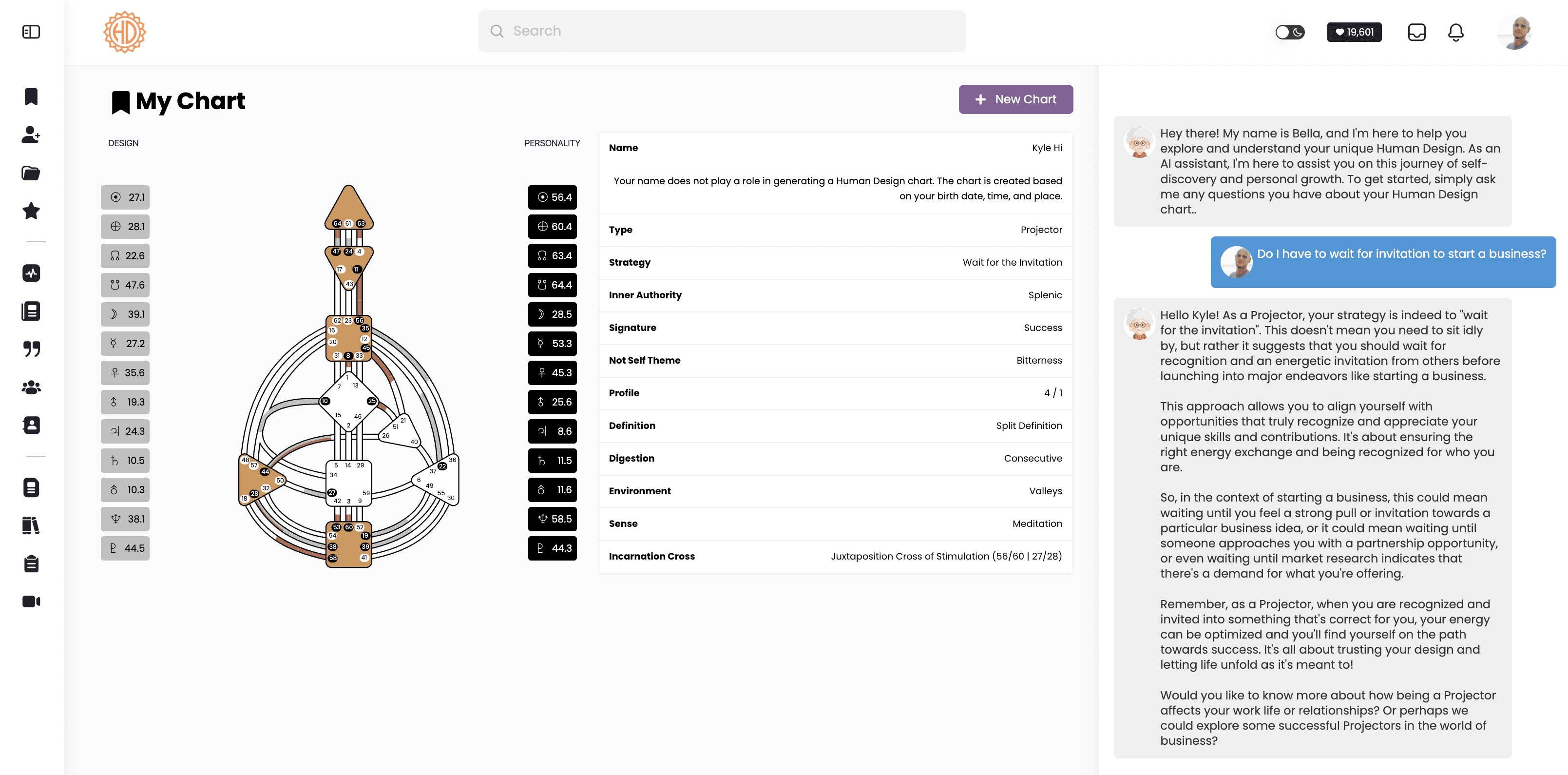

Join the HDAI community of 9800+ members worldwide!
Beautifully Simple
A Human Design expert in your pocket that knows your chart inside out, available 24/7 to answer even the most trivial of questions.


Intelligent Chatbot Fully Integrated Into Your Bodygraph Chart
Ask real questions, and get real response. Bella offers deep chart analysis, interactive learning, and personalized guidance like never before.






Your Personal Timeline: Track Your HD Journey
Your profile isn't just a snapshot—it's a dynamic timeline of your Human Design journey. Follow your progress, track your insights, and reflect on your growth over time as you delve deeper into the mysteries of your unique design.


a roadmap to understanding yourself on a deeper level
Human Design isn't just a tool—it's a roadmap to understanding yourself on a deeper level, empowering you to make informed decisions and navigate life's challenges with clarity and confidence. Join us on a mission to make Human Design accessible to everyone, and unlock the potential within your unique design today.


Create Your Free Account
Your journey to self-discovery begins here. Sign up now and embark on a transformative experience tailored to your individual design.
Key Features
That Make HumanDesign.ai Your Ultimate Guide
Chart Analysis
Dive deep into your chart with advanced analysis tools, uncovering hidden layers and gaining clarity on your unique design.
Interactive Learning
Engage with our AI chatbot for personalized responses, pose questions, seek clarity, and explore Human Design in an interactive way.
Personalized Guidance
Unlock comprehensive chart analysis and personal development advice, empowering you to navigate life's challenges with confidence.
Curated Content Just for You
Access curated videos, articles, and resources personalized to your chart variables, providing targeted guidance and inspiration.
Flexible Membership Plans
Choose from our range of membership plans tailored to your needs, whether you're seeking personal insights or professional development.
Community Engagement
Connect with a passionate community of over 10,000+ members, sharing insights, experiences, and support on your Human Design journey.
Our Plans
Free
For newbies, tire-kickers and curious cats.What's included
AI Chatbot Integrated BodyGraph
Generate unlimited charts
Showcase your Chart On Your Profile
Share your journey With others
Access Curated Articles & Videos
15 FREE Questions Included
Community Support
No Credit Card Required
Personal Most Popular
For hobbyists, self-explorers and HD lovers.What's included
- Everything In Free Plus..
Read Other People's Charts
Read Celebrity Charts
Advanced Celebrity Filters
Advanced Chart Library Filters
- Download Your Conversations
Includes 40 Questions Per Month
- 20% Discount On Additional Tokens
Community & Ticketing Support
Pro Best ROI
For solopreneurs, analysts & coaches.What's included
Everything In Personal Plus..
Add Value & Earn Money Reading Charts
- Publish Content & Attract Followers
- Offer Readings & Accept Bookings
Sell Books, Retreats & Courses
- Create Groups & Host Discussions
Includes 150 Questions Per Month
30% Discount On Additional Tokens
Community, Ticketing & Email Support
Kind words from our members.
"HumanDesign.ai has revolutionized my understanding of Human Design. The AI assistant's insights are spot-on, and the community is incredibly supportive."


"The lifetime membership value is unbeatable, and knowing I have access to future upgrades is fantastic. Thrilled to continue my journey!"


Frequently Asked Questions
Get quick answers to common questions about HumanDesign.ai, from how it works to membership options and community engagement. Start your self-discovery journey confidently.













